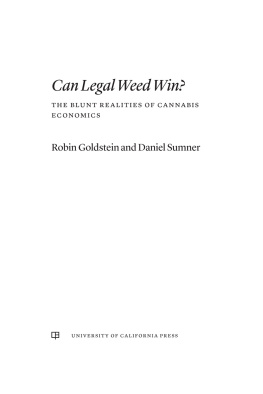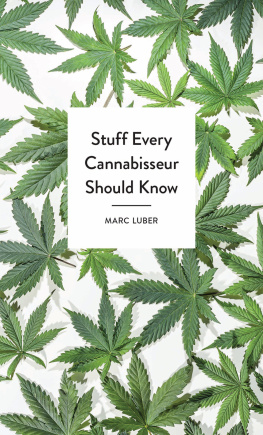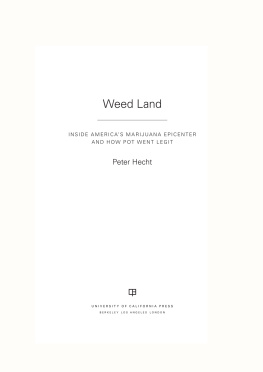Robin Goldstein - Can Legal Weed Win?: The Blunt Realities of Cannabis Economics
Here you can read online Robin Goldstein - Can Legal Weed Win?: The Blunt Realities of Cannabis Economics full text of the book (entire story) in english for free. Download pdf and epub, get meaning, cover and reviews about this ebook. year: 2022, publisher: Univ of California Press, genre: Politics. Description of the work, (preface) as well as reviews are available. Best literature library LitArk.com created for fans of good reading and offers a wide selection of genres:
Romance novel
Science fiction
Adventure
Detective
Science
History
Home and family
Prose
Art
Politics
Computer
Non-fiction
Religion
Business
Children
Humor
Choose a favorite category and find really read worthwhile books. Enjoy immersion in the world of imagination, feel the emotions of the characters or learn something new for yourself, make an fascinating discovery.
- Book:Can Legal Weed Win?: The Blunt Realities of Cannabis Economics
- Author:
- Publisher:Univ of California Press
- Genre:
- Year:2022
- Rating:4 / 5
- Favourites:Add to favourites
- Your mark:
- 80
- 1
- 2
- 3
- 4
- 5
Can Legal Weed Win?: The Blunt Realities of Cannabis Economics: summary, description and annotation
We offer to read an annotation, description, summary or preface (depends on what the author of the book "Can Legal Weed Win?: The Blunt Realities of Cannabis Economics" wrote himself). If you haven't found the necessary information about the book — write in the comments, we will try to find it.
Can Legal Weed Win?: The Blunt Realities of Cannabis Economics — read online for free the complete book (whole text) full work
Below is the text of the book, divided by pages. System saving the place of the last page read, allows you to conveniently read the book "Can Legal Weed Win?: The Blunt Realities of Cannabis Economics" online for free, without having to search again every time where you left off. Put a bookmark, and you can go to the page where you finished reading at any time.
Font size:
Interval:
Bookmark:

The publisher and the University of California Press Foundation gratefully acknowledge the generous support of the Barbara S. Isgur Endowment Fund in Public Affairs.
Robin Goldstein and Daniel Sumner

UNIVERSITY OF CALIFORNIA PRESS
University of California Press
Oakland, California
2022 by Robin S. Goldstein and Daniel A. Summer
Library of Congress Cataloging-in-Publication Data
Names: Goldstein, Robin (Robin S.), 1976 author. | Sumner, Daniel A. (Daniel Alan), 1950 author.
Title: Can legal weed win? : the blunt realities of Cannabis economics / Robin Goldstein and Daniel Sumner.
Description: Oakland, California : University of California Press, [2022] | Includes bibliographical references and index.
Identifiers: LCCN 2021045185 (print) | LCCN 2021045186 (ebook) | ISBN 9780520383265 (hardback) | ISBN 9780520383272 (ebook)
Subjects: LCSH : Marijuana industryEconomic aspectsCalifornia. | Marijuana industryLaw and legislationCalifornia. | MarijuanaLaw and legislationCalifornia.
Classification: LCC HD 9019. M 382 U 625 2022 (print) | LCC HD 9019. M 382 (ebook) | DDC 338.1/737909794dc23/eng/20211006
LC record available at https://lccn.loc.gov/2021045185
LC ebook record available at https://lccn.loc.gov/2021045186
Manufactured in the United States of America
31 30 29 28 27 26 25 24 23 22
10 9 8 7 6 5 4 3 2 1
Las Vegas, Nevada, December 2019. At the weed industrys biggest conference of the year, MJBizCon (Figure 1), hundreds of white male investors in suits are pacing around angrily. Many of the investors have lost most of the money they ever invested in weed. A major cannabis stock index has fallen 80 percent in 2019. Californias legal weed market is officially in crisis mode, according to Marijuana Business Daily.

FIGURE 1. MJBizCon, Las Vegas, December 2019. Credit: Marijuana Business Daily / Soliman Productions.
At a self-styled investor intelligence summit preconference at the Cosmopolitan Hotel, investors and industry experts are diagnosing the disaster. Some investors blame Canadian holding companies or private equity hustlers for their woes. Others blame state governors, regulators, or stoners in the forest.
In the midst of the rubble, others claim to see a silver lining in the legal weed crisis: a new buy-low opportunity, which has arisen from the near collapse of the market for legal weed. These fearless optimists, whose ranks include former U.S. senator Tom Daschle, a keynote speaker at MJBizCon, double down on their positions and steer others to join them. Daschle, a Democrat from South Dakota who served as U.S. Senate majority leader, is an adviser to and shareholder in Northern Swan Holdings, a multinational weed cultivator with offices in New York, Toronto, Bogot, and Frankfurt that raised about $100 million in venture capital.
Joining Daschle in the ranks of top U.S. government leaders-turned-cannabis entrepreneurs (or lobbyist cheerleaders, depending on how much of their own pensions you think they planted to weed) is John Boehner. Boehner, from the other side of the aisle, was a Republican congressman from Ohio who served as speaker of the House from 2011 to 2015. During his career in Congress, Boehner was a steadfast and outspoken opponent of legalizing weed. Today, Boehner is on the board of Acreage Holdings, which announced a $3.4 billion acquisition deal with Canopy Growth, the worlds most valuable weed company.
The weed investor optimists rely on the opinions of many industry analysts and financial reporters, who predict a major turnaround for a U.S. cannabis retail market that, in the aggregate, they see growing as large as $80 to $100 billion (on the scale of the U.S. beer market) over the next few decades.
Thomas Carlyle famously called economics the dismal science. Economists take this mandate seriously, so the stories in this book will make it clear why we think many legal weed investors and their analysts have let the smoke get in their eyes, or at least let romantic sentiments overwhelm some simple facts and standard economic reasoning.
In many states that have fully legalized weedby which we mean the introduction of state licensing, regulations, and taxes on the production and sale of recreational or adult-use weed to just about anyone 21 or over, from in state or out of statethere is now a relatively small legal weed market and a much larger illegal one.
In California, three years into the era of legalization under the Proposition 64 ballot initiative, data indicate that only about one-quarter of weed sold and consumed in the state is legally licensed and that the remaining three-quarters is produced outside legal market channels.
This dominance of illegal goods over legal ones, even well after the weed market was legalized, should not seem surprising. Call it the economics of common sense: lower-priced sellers will win out unless the more expensive seller brings something special to the market. This rule tends to hold especially when the lower-priced option has been satisfying customers for decades.
What we have learned from our data and research over the past few years is that for the bulk of weed buyers, licensed, taxed, and regulated weed does not bring much that is special to the marketat least so far.
Legal and illegal weed look similar and have similar sensory and psychoactive qualities, but illegal weed is cheaper to produce and market than legal weed. Getting legally compliant means lots of fees; unknown, and almost always longer-than-expected, waiting periods; complex testing, tracking, packaging, and labeling requirements; and steep cannabis taxes. Staying compliant means constant monitoring to stay on the narrow course amid myriad mandates, some cannabis-specific, but many applying to any legal business. Illegal weed businesses do not face any of these costs or taxes, so they can run leaner, lower-cost operations and sell comparable products for lower prices than legal businesses can.
In our own analysis of a 201921 data set of more than 30 million publicly advertised U.S. retail weed prices, we are finding that prices at unlicensed weed retailers are significantly lower than prices at licensed retailersin some states, and in some categories, as much as 50 percent lower.
Can legal weed prices ever become more sufficiently competitive with illegal weed prices?
Some costs in the legal weed market will surely fall over time as companies learn how to comply efficiently. It is possible that legal weed production might eventually reach a scale of sophistication that allows efficiencies to overcome the taxes and regulations. Such efficiencies might allow legal weed to compete on price with unlicensed cannabis. Such convergence may be happening in Colorado and Washington, where legal flower on the low end of the price scale now sells for less than $300 per pound wholesale.
However, once a producer or marketer is in the legal weed segment, governments may impose new regulatory costs or taxes on the producer at any time, as California did when it raised both its cultivation and its excise taxes in 2020. In many states, it is not clear whether the price of legal weed will ever be competitive with the price of illegal weed for most consumers. However, we think there are some regulatory steps that could help bring down the price of legal weed and make legal weed more viable in the marketplace.
Font size:
Interval:
Bookmark:
Similar books «Can Legal Weed Win?: The Blunt Realities of Cannabis Economics»
Look at similar books to Can Legal Weed Win?: The Blunt Realities of Cannabis Economics. We have selected literature similar in name and meaning in the hope of providing readers with more options to find new, interesting, not yet read works.
Discussion, reviews of the book Can Legal Weed Win?: The Blunt Realities of Cannabis Economics and just readers' own opinions. Leave your comments, write what you think about the work, its meaning or the main characters. Specify what exactly you liked and what you didn't like, and why you think so.










